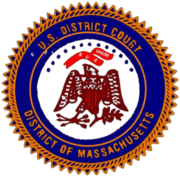| United States v. LaMacchia | |
|---|---|
 | |
| Court | United States District Court for the District of Massachusetts |
| Full case name | United States of America v. David LaMacchia |
| Decided | 28 December 1994 |
| Citation | 871 F.Supp. 535 |
| Holding | |
| Copyright prosecutions may only be brought under Section 506 of the Copyright Act, which does not include non-commercial copyright infringement within its scope. | |
| Court membership | |
| Judge sitting | Justice Richard Stearns[1] |
| Keywords | |
| NET Act, copyright infringement, LaMacchia Loophole, wire fraud, Copyright Act, Cynosure | |
United States v. LaMacchia 871 F.Supp. 535 (D.Mass. 1994) was a case decided by the United States District Court for the District of Massachusetts which ruled that, under the copyright and cybercrime laws effective at the time, committing copyright infringement for non-commercial motives could not be prosecuted under criminal copyright law.
The ruling gave rise to what became known as the LaMacchia Loophole which is that criminal charges of fraud or copyright infringement would be dismissed under current legal standards, so long as there was no profit motive involved.[2] The court's ruling explicitly drew attention to a perceived shortcoming of the law that there was no criminal liability under the Copyright Act for even large-scale non-commercial copyright infringement. The NET Act, passed in 1997, was a direct response to the LaMacchia Loophole. The law provides for criminal prosecution of individuals who engage in copyright infringement even when there is no commercial benefit from the infringement.
- ^ Lewis, Peter H. (December 31, 1994). "Judge Rejects Computer-Crime Indictment". The New York Times. Archived from the original on 29 April 2014. Retrieved April 26, 2022.
{{cite news}}: CS1 maint: unfit URL (link) - ^ "United States of America v. David LaMacchia, Memorandum of Decision and Order on Defendant's Motion to Dismiss". 28 December 1994.